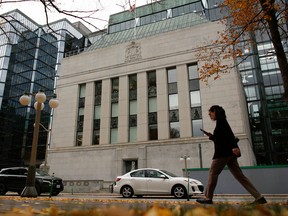Kevin Carmichael: David McKay’s comments complicate the Bank of Canada’s ability to control the narrative
Article content
How are you going to spend your pandemic savings? Think carefully. The answer should inform the path for interest rates, but the two most important figures in Canadian finance disagree on how you’ll respond.
Advertisement
This advertisement has not loaded yet, but your article continues below.
Article content
David McKay, chief executive of Royal Bank of Canada, the country’s biggest lender and second-biggest company by market capitalization after Shopify Inc., thinks we’re on the verge of an epic shopping spree.
Tiff Macklem, the Bank of Canada governor, concedes that possibility, but thinks it’s more likely a shell-shocked nation will use most of its excess cash to save, invest and pay off debt. His outlook is one of the reasons the central bank doubled down on its pledge to leave the benchmark lending rate at 0.25 per cent until at least the second half of 2022, even as inflation escaped the Bank of Canada’s comfort zone this summer.
Macklem and his peers at other central banks see inflation as mostly a one-off due to pandemic-related supply disruptions. Elevated unemployment rates, among other indicators, suggest the economy has plenty of room to expand before it begins testing its ability to generate non-inflationary growth. “There is still considerable excess supply in the economy,” he said on a conference call with reporters on Oct. 7. “There is capacity to meet that demand.”
Advertisement
This advertisement has not loaded yet, but your article continues below.
Article content
That capacity is closing. Statistics Canada’s capacity utilization rate, which measures the extent to which industry is maximizing its production capability, was 82 per cent in the second quarter , lower than 84.3 per cent two year earlier, but about the same as it was at the start of 2020. The unemployment rate was 6.9 per cent in September, compared with pre-pandemic levels of around 5.5 per cent.
But the crux of the debate is about whether a crisis unlike any of us has ever experienced has altered our propensity to spend. Households were sitting on savings of $208 billion in the second quarter, compared with $17.9 billion in the second quarter of 2019, according to Statistics Canada data.
Bankers in Canada and the United States doubt North Americans have lost their taste for conspicuous consumption. Much of the household savings glut represents money that is “just sitting there waiting to be spent,” McKay told a virtual audience assembled by the Institute of International Finance on Oct. 13.
Advertisement
This advertisement has not loaded yet, but your article continues below.
Article content
“The debate between central bankers and CEOs is how fast does it get spent and where does it get spent,” he continued. “Most central bankers think it is going to be a decade and that it’s largely going to go to pay down debt first. Corporate CEOs think it’s going to get consumed and, therefore, create demand. The balance between those two worlds, I think, is one of the biggest drivers of where you come out on the inflation argument and the (economic) growth rate.”
McKay’s comments complicate the Bank of Canada’s ability to control the narrative, key to managing expectations about where prices are headed. Coffee-counter chatter about the price of lumber can be explained away, and ideologically tinged rants about how monetary policy is debasing the currency can be ignored. Expressions of doubt from the head of the country’s biggest financial institution represent a different level of criticism. The central bank will need a convincing story when it next updates its economic outlook on Oct. 27; that, or concede that McKay is right and change course entirely.
Advertisement
This advertisement has not loaded yet, but your article continues below.
Article content
For now, Macklem is sticking to his position that inflation is transitory. Asked about McKay’s comments, the governor reiterated that price pressures will recede as soon as suppliers and logistics companies work through an unusual array of disruptions ranging from port congestion to drought. “There is a fair amount of ingenuity in the business community,” he told reporters on Oct. 14. “They have in the past found ways to work through these.”
The Bank of Canada isn’t overly worried that its policies will unleash more demand than the economy can handle. Its quarterly surveys of consumer sentiment suggest that households are less keen to splurge on stuff they don’t really need.
-

Blockchain, AI, internet of things will change banking, RBC CEO says
-

An end to super-cheap money? Central banks begin tightening cycle
-

BoC likely to let inflation run hot, keep interest rates low, Teachers’ chief economist says
Advertisement
This advertisement has not loaded yet, but your article continues below.
Article content
The central bank’s first post-pandemic outlook predicted that very little of Canadians’ excess savings would find its way into the economy through consumption. Policy-makers later adjusted that view somewhat in July, predicting that 20 per cent of savings would be spent buying goods and services, while the rest would be used to pay off debt, purchase homes and invest. Macklem said another revision is possible once they crunch the numbers for the next outlook.
“What (households) have been telling us is they will continue to save a lot of it, but they are going to spend part of it,” he said. “We will continue to revise those estimates in line with what we hear.”
An upward revision on spending could force the Bank of Canada to raise interest rates sooner than planned. The central bank’s current guidance is that it won’t lift the benchmark rate before the second half of next year, even though inflation has soared to four per cent, twice Macklem’s target.
That’s a reasonable stance if inflationary pressures are coming from weird supply issues. Higher interest rates won’t help ports unload ships any faster, nor will they bring rain to parched fields or speed the production of computer chips. But they would curb demand.
If evidence starts to show that we’re as materialistic as we were before the pandemic, it might be a good idea to factor higher interest rates into your spending plans.
• Email: kcarmichael@postmedia.com | Twitter: carmichaelkevin
Advertisement
This advertisement has not loaded yet, but your article continues below.
If RBC CEO is right about impending spending spree, interest rates will rise sooner than expected
2021-10-15 20:15:12





